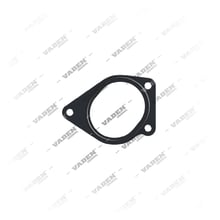Water Pump: Your Engine's Vital Cooling Component and Maintenance Guide
Your vehicle's engine generates tremendous heat during operation. Effectively managing this heat is crucial for engine performance, efficiency, and most importantly, longevity. This is where the water pump comes into play. As the heart of the engine cooling system, the water pump ensures the continuous circulation of cooling fluid, preventing your engine from overheating.
In this article, we will delve into what a water pump is, what it does, common signs of failure, and how to maintain it. The importance of a functioning water pump is especially significant in heavily-used vehicles like heavy-duty trucks.
What is a Water Pump and How Does It Work?
The water pump is a fundamental part of the engine cooling system. Its job is to pump the antifreeze or coolant, which has been cooled in the radiator, through the engine block and cylinder head to absorb heat. The coolant then carries this absorbed heat back to the radiator, where it cools down again via airflow, completing the cycle. The water pump is the mechanical device that facilitates this continuous and forced circulation. It is typically driven by the engine's crankshaft via a belt (often a serpentine belt or timing belt).
The Vital Functions of Your Water Pump
The main roles a water pump fulfills for engine health include:
- Circulating Coolant: It constantly pumps cooling fluid between the radiator and the engine block.
- Preventing Overheating: It helps maintain the engine's ideal operating temperature, preventing critical components from being damaged by excessive heat.
- Ensuring Balanced Heat Distribution: It aids in equalizing the temperature across different parts of the engine, promoting uniform cooling of components.
Without a water pump, the coolant would become stagnant within the engine, heat up rapidly, and cause the engine to overheat severely in a very short time. This can lead to serious damage, ranging from a blown head gasket to complete engine seizure.
Features of a High-Quality Water Pump
Choosing the right water pump is essential for long-lasting and efficient engine performance. Key features to look for in a quality water pump include:
- Durable Material: It must be constructed from materials resistant to high temperatures and continuous operation.
- High Efficiency: It should circulate coolant quickly and effectively throughout the system.
- Quiet Operation: A well-designed pump will operate smoothly with minimal friction and vibration.
- Vehicle Model Compatibility: It must be fully compatible with your vehicle's specific engine type and model.
Especially in the heavy-duty vehicle sector, trusted brands like VADEN ORIGINAL offer water pump products that meet high-quality standards.
Water Pump Failure Symptoms and Signs
When a water pump starts to fail, it signals potential trouble for your engine. Common symptoms to watch out for include:
- Coolant Leaks: Damage to the pump seals or a crack in the housing can cause coolant to leak. You might notice pink, green, or orange puddles or residue around the pump area.
- Engine Overheating: If the water pump is not circulating coolant properly, the engine will quickly overheat. The temperature gauge on your dashboard will rise into the red zone.
- Unusual Noises: Worn bearings or a loose impeller inside the pump can cause grinding, whining, or squealing noises emanating from the front of the engine.
- Inconsistent Cooling: Fluctuations in engine temperature or the engine running consistently hotter than usual can indicate that the pump is not performing its job effectively.
If you notice any of these symptoms, it is critical to have the water pump inspected immediately and replaced if necessary.
Water Pump Maintenance Tips
Regular maintenance is key to extending the life of your water pump and protecting your engine's health:
- Check Coolant: Regularly check the coolant level and condition. Dirty or low coolant can damage the pump.
- Inspect for Leaks: Visually inspect around the water pump and cooling system hoses for any signs of leaks.
- Follow Routine Service: Have your cooling system and water pump inspected by a qualified mechanic at the intervals recommended by your vehicle manufacturer.
- Use Genuine or Quality Parts: When replacement is needed, using a high-quality or genuine water pump compatible with your vehicle will enhance system efficiency and longevity.
Conclusion: The Water Pump is Your Engine's Guardian
The water pump is a critical component for your engine's performance and safety. Choosing a high-quality water pump and performing regular maintenance are essential steps to prevent engine overheating and extend the life of your vehicle.
If you are looking for a reliable water pump for your vehicle, particularly for heavy-duty applications, durable and high-performance solutions from brands like VADEN ORIGINAL are an excellent choice. Never neglect water pump maintenance for the health of your engine!
















